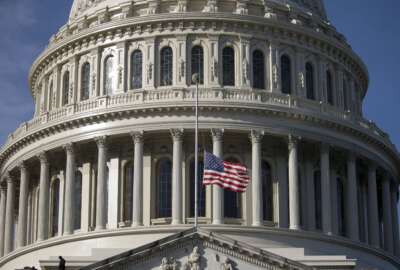
That new federal regulatory agenda has generated opposition
The Biden administration recently declared a new approach to federal regulation it said would modernize and streamline it.
The Biden administration recently declared a new approach to federal regulation it said would modernize and streamline it. The new framework has drawn opposition from business. For one point of view, Federal Drive with Tom Temin spoke with Chad Whiteman, the vice president of Environment and Regulatory Affairs at the U.S. Chamber of Commerce.
Interview transcript:
Tom Temin Now, this does a lot of things, including electronic handling of bots and this kind of thing, which probably are useful updates. But I’m guessing, the big change that has industry worried is the raising of the threshold of the size of regulation cost that sparks the cost benefit analysis.
Chad Whiteman That’s a big part of it and a good point to raise. Certainly, when regulations are scrutinized by agencies looking closely at costs and benefits, it helps with better decision making, it helps with better regulatory durability. And we’re afraid that this moves in the other direction.
Tom Temin Tell me more what the mechanism is by which that would happen.
Chad Whiteman Well, there is a new executive order that would apply to statutory agencies. The big agencies, many of them issue a lot of regulations each year. And when they decide what type of analysis and resources to put into the regulatory development process, they’ll be looking at the costs. And if the costs now are the low end of the requirement to do this analysis is being taken away. So not even the low end, but cost between 100 million and 200 million per year is this new category that doesn’t require this extra scrutiny from agencies through cost benefit analysis.
Tom Temin Right. And a lot of rules fall into that category.
Chad Whiteman That’s right. And not just a lot of rules, but once you start getting up around $100 million per year in costs or even benefits, those rulemaking are not just regional or local, have local impacts, but they can have impacts across the economy.
Tom Temin Sure. And one of the justifications was to streamline this whole thing for federal agencies. But would you say that the streamlining for the agencies comes at the expense of the regulated entities?
Chad Whiteman Well, that’s a really good point. And one of our other concerns is the centralized regulatory review process provides the ability for an administration to moderate the regulatory agenda. And we think that this really puts the gas pedal on regulatory proposals without looking cumulatively across the government and what an accelerated, aggressive regulatory agenda could have impacts on the economy and businesses.
Tom Temin Which agencies do you expect would be the most active under this new regime if it comes to be? I’m thinking probably EPA would be one, maybe transportation.
Chad Whiteman Certainly, EPA is one of the top regulatory agencies with looking at climate change as being one of the administration’s top priorities. They have a whole suite of regulatory proposals there. Other agencies HHS, Health and Human Services, [Department of Transportation (DOT)], of course, with all of the funding going out through [Infrastructure Investment and Jobs Act (IIJA)] and others, if their regulations associated with that, there will be a whole breadth of different regulations all across the economy that fall under this new executive order.
Tom Temin We’re speaking with Chad Whiteman. He’s vice president of Environment and Regulatory Affairs at the Chamber of Commerce. Industry commenting, has been part of the rulemaking process. And one of the things they’re trying to eliminate is just this endless, repetitive bot-generated commenting, or sometimes they get millions of comments that are identical, and they want to try to figure out a way to stabilize that or neutralize that. Will that have any effect, do you think, also on this?
Chad Whiteman It might. Certainly, there are advocacy campaigns on significant regulatory policy, and regulation shouldn’t really be a popularity contest. They should be based on sound analysis and policy judgments. And certainly, we think that costs and benefits are a very helpful tool in informing regulatory policy. So we hope that stakeholders who are impacted will continue to have the ability to engage agencies as they develop their regulations.
Tom Temin Because industry in the last few years has been pretty contrite when it comes to whatever the latest agenda item is coming out of administrations. Many years ago, I remember industry would stand up on its hind legs if they didn’t like something coming, say, the car industry or the appliance industry. But now you don’t hear much. You don’t hear Whirlpool or Tappan saying, what do you mean by trying to get rid of gas stoves or the car industry? All the executives there never believed much in electrification. Now, not one of them talks about anything but electrification.
Chad Whiteman There are some challenges here for companies. I think, looking at the changes in these regulations, if it’s going to accelerate the regulatory agenda of the administration, if it’s going to put his thumb on the scale of benefits and minimizing the consideration of direct costs to industry, I think the response that folks will be giving will probably be a stronger response going forward, because it’s shifting the balance and moving in a direction that could make these regulations much more stringent and much more difficult for compliance.
Tom Temin Yeah, the emphasis on benefits, you do hear this more and more nowadays, the kind of expression, well, even if it only saves one life, it’s worth it. But if it costs a billion dollars and 100 million people will be affected and only one will die, under classic cost benefit analysis, it may sound hardhearted, but that is something that you go for the cost side and not the benefit side.
Chad Whiteman Certainly, regulatory cost benefit analysis calls for weighing costs against benefits, and even the long standing executive orders that have been in place for some time, direct agencies to consider that in the decision making. One of the concerns we have with the policy, is it seems to be pushing the analytic approach aside and favoring more subjective judgments, which can lead to decisions that may not be durable, may not be even feasible to implement.
Tom Temin And are you concerned about what type of financial and investment and disclosure regulations could come from, say, the [Securities and Exchange Commission (SEC)], which might favor the corporate finance emphasis on things other than the most profit, the most return to stockholders?
Chad Whiteman The chamber has a breadth of members who increasingly are taking action on climate change, disclosing their emissions, setting targets out into the future. But one of the challenges is when agencies jump into a space where either they haven’t before or there are questions about the statutory authority for them to do it. It certainly raises questions, and gets to cost benefit analysis, certainly one tool, again, that agencies can use to provide feedback on the impacts of their policies.
Tom Temin So what will the chamber, what will industry do if you oppose this, to try to mitigate it or stop it, if anything?
Chad Whiteman Well, that’s certainly a good question. We hope to engage the administration. We’ll certainly be submitting comments and trying to get in to talk to the White House Office of Management and Budget and any other parts of the government, in particular, as it is implemented through various regulatory policies. Our request is they immediately withdraw the executive order and the guidance and stick with what has been in place for the last four years.
Tom Temin And would you ask, say, Congress to intervene? They’re kind of write the laws that give way to regulation, because that’s the way the system basically works. But there has been occasional congressional intervention in rulemaking.
Chad Whiteman Yeah, we have certainly supported bills on the Hill that would push for more cost benefit analysis and regulations and the requirement that they are considered. So we’ll certainly be working with Hill folks, anyone that wants to work with us on any side, to hear out stakeholder community issues on something this state.
Copyright © 2025 Federal News Network. All rights reserved. This website is not intended for users located within the European Economic Area.
Tom Temin is host of the Federal Drive and has been providing insight on federal technology and management issues for more than 30 years.
Follow @tteminWFED
Related Stories





